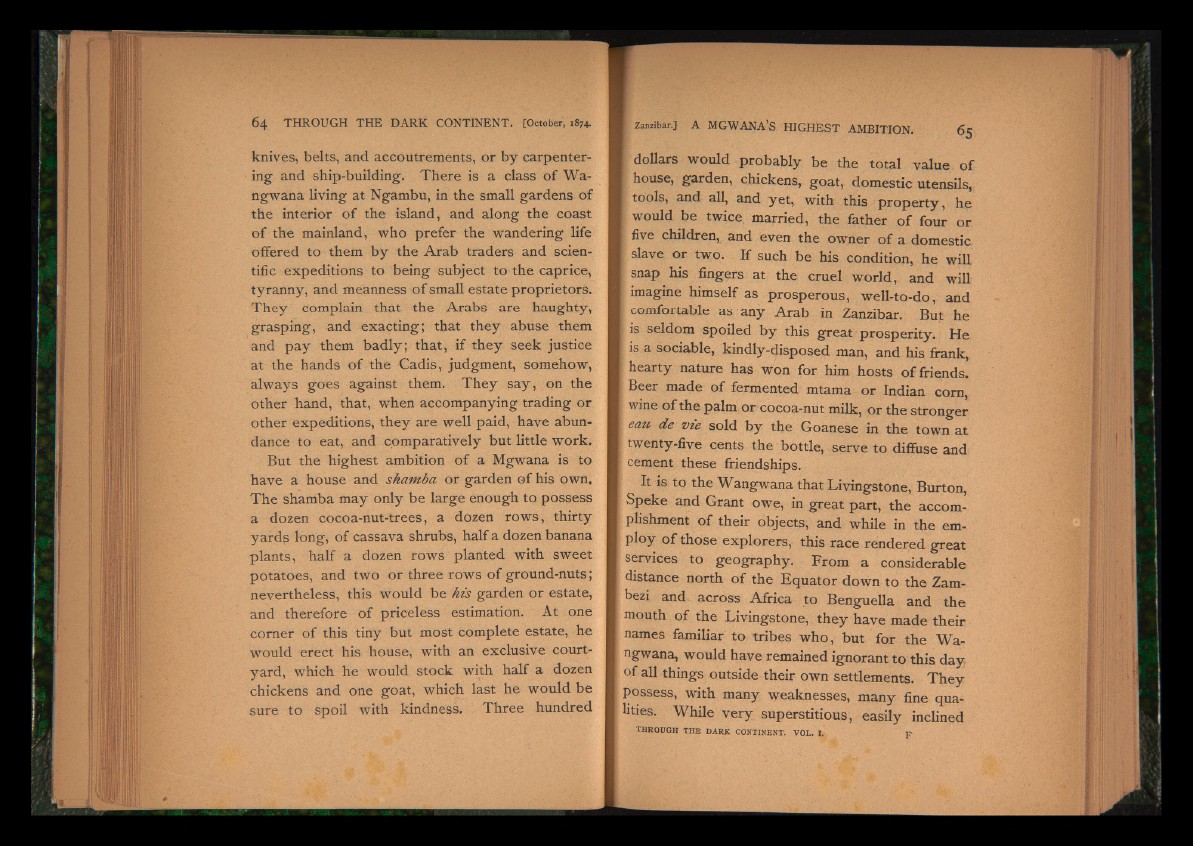
knives, belts, and accoutrements, or b y carpentering
and ship-building. There is a class o f Wa-
ngwana living at Ngambu, in the small gardens o f
the interior o f the island, and along the coast
o f the mainland, who prefer the wandering life
offered to them b y the Arab traders and scientific
expeditions to being subject to the caprice,
tyranny, and meanness o f small estate proprietors..
T h e y complain that the Arabs are haughty,
grasping, and exacting; that they abuse them
and p a y them badly; that, if th ey seek justice
at the hands o f the Cadis, judgment, somehow,
always goes against them. T h e y sa y , on the
other hand, that, when accompanying trading or
other expeditions, they are well paid, have abundance
to eat, and comparatively but little work.
But the highest ambition o f a Mgwana is to
have a house and shamba or garden o f his own.
T h e shamba may only be large enough to possess
a dozen cocoa-nut-trees, a dozen rows, thirty
yard§ long, o f cassava shrubs, half a dozen banana
plants, half a dozen rows planted with sweet
potatoes, and two or three rows o f ground-nuts;
nevertheless, this would be h is garden or estate,
and therefore o f priceless estimation. At one
corner o f this tiny but most complete estate, he
would erect his house, with an exclusive courtyard,
which he would stock with half a dozen
chickens and one goat, which last he would be
sure to spoil with kindness. Three hundred
dollars would probably be the total value o f
house, garden, chickens, goat, domestic utensils,
tools, and all, and yet, with this p rop e rty , he
would be twice married, the father o f four or
five children, and even the owner o f a domestic
slave or two. If such be his condition, he will
snap his fingers at the cruel world, and will
| imagine himself as prosperous, well-to-do, and
I comfortable as any Arab in Zanzibar. But he
is seldom spoiled b y this great prosperity. He
[ is a sociable, kindly-disposed man, and his f ra n k ,
I hearty nature has Won for him hosts o f friends.
Beer made o f fermented mtama or Indian corn,
wine o f the palm or cocoa-nut milk, or the stronger
' eau de v ie sold b y the Goanese in the town at
i twenty-five cents the bottle, serve to diffuse and
cement these friendships.
It is to the Wangwana that Livingstone, Burton,
Speke and Grant owe, in great part, the accomplishment
o f their objects, and while in the emp
loy o f those explorers, this race rendered great
services to geography. From a considerable
distance north o f the Equator doWn to the Zambezi
and across Africa to Benguella and the
mouth o f the Livingstone, th ey have made their
names familiar to tribes who, but for the W a ngwana,
would have remained ignorant to this day
of all things outside their own settlements. T h e y
possess, with many weaknesses, many fine qualities.
While v e ry superstitious, easily inclined
THROUGH THE DARK CONTINENT. VOL. I. p